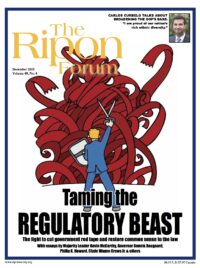
The U.S. National Debt clock tells us we’re over $18 trillion in the hole.
But at least we can measure that.
Conversely, I’m here to say that, by being AWOL on addressing the “hidden tax” of federal regulation, policymakers miss the government’s greatest impact in the economy.
By my reckoning, regulations cost some $1.8 trillion per year, a “hidden tax half the level of today’s $2.5 trillion in annual federal spending. The regulatory burden exceeds individual income tax receipts of $1.39 trillion and corporate income tax of $333 billion combined.
Regulatory burdens even rival corporate pretax profits, of $2.2 trillion.
If the “regulatory state” were a country, it would be the 10th largest, between Russia and India.
If the “regulatory state” were a country, it would be the 10th largest, between Russia and India.
Clearly, Congress has not only lost its grip on the power of the purse, it has relinquished its lawmaking power to federal agencies.
Consider: There were 224 laws last year, but 3,554 rules and regulations issued by unelected bureaucrats. I like to call the multiple (16 in this case) the “Unconstitutionality Index.”
Regulation from the unelected bureaus seems to be accelerating: of the six highest ever Federal Register page counts, five have occurred under President Barack Obama. And at 74,964 on November 30, the year 2015 may set another record.
Ill-founded, overlapping and unclear regulations (like over-taxation) undermine business creation and job growth. Startups are at a record low. Hiring is risky. The uncertainty created by Washington undermines entrepreneurial breakthroughs, slowing growth.
Rudimentary constraints on the regulatory state are lacking; fewer than one percent of federal agency rules get cost-benefit analysis reviewed by overseers at the White House Office of Management and Budget.
Executive oversight is weak already, yet President Obama promises vetoes of the majority Republican 114th Congress’ reform proposals.
The President promised to veto the Regulatory Accountability Act of 2015 (H.R. 185), the signature regulatory reform bill that passed the second week of the new session. It would codify some executive orders that define central Office of Management and Budget oversight of agencies’ regulations and cost-benefit analyses, and also formalize semi-judicial proceedings for major rules and address abuse of “guidance documents.” The Senate has yet to pass the bill, but should.
This year and in both prior Congresses, the House passed the so-called REINS Act (Regulations from the Executive In Need of Scrutiny) to reverse regulation. REINS would require an expedited congressional vote on all major or significant agency rules before they are effective.
REINS should be expanded to apply to any controversial rule, whether or not tied to a cost estimate that declares it major or significant (such as the Federal Communications Commission’s net neutrality rule). Furthermore, congressional approval should extend further to guidance documents and other “regulatory dark matter” decrees.
This positive affirmation would be a major advance in accountability for each year’s thousands of regulations. The Senate hasn’t passed REINS yet — but the President promises a veto here, too.
Ultimately, only Congress can compare questionable rules to the benefits that could be gained if resources went elsewhere. So, Congress should also explore allocating regulatory cost authority among agencies in a “regulatory budget.” A “budget” could incentivize other supervisory mechanisms like central review, cost analysis, sunsets, plus inspire agencies to “compete” with one another in terms of lives saved rather than think within their own box.
Ultimately, only Congress can compare questionable rules to the benefits that could be gained if resources went elsewhere.
Perhaps the most promising option for bipartisan cooperation at the moment is a “regulatory reduction commission.” This body would initiate review, similar to the military base closure and realignment commission, of the entire existing regulatory apparatus (as distinct from the one-by-one appraisal that characterizes OMB review). The commission would compile a bundle of rules for rollback with expedited congressional vote.
Alas, today’s policy climate is quite different from the 1990s, when Republicans proposed outright elimination of agencies like the Department of Energy.
But at the very least, Congress should pass regulatory liberalization legislation in the Senate and force Obama to veto it, and get members on the record. Surely, some Democrats are not going to go to the mat for maintaining a regulatory state that harms their constituents.
Meanwhile, as the presidential election approaches, we might ponder what the executive’s “pen and phone” (a term popularized by Obama) can do to reduce rather than increase government influence in the economy.
We knew from our Constitution’s framers and we know now from the modern pen and phone era that, for better or worse, an energetic executive’s hands are far from tied. Alexander Hamilton sought a king, but settled for vigorously defending “Energy in the Executive.”
An “energetic” liberalization attitude prevailed in the executive branch during the Reagan administration and resulted in the creation of the very executive branch review and oversight process that we have now (albeit since watered down by Bill Clinton and Obama.) Reagan brought both Federal Register page counts and numbers of annual rules down by thousands.
Instead of a “pen and phone,” we can give “liberty’s meat axe” a try again.
The President must execute duly enacted laws; but the thousands of arbitrary decrees of unelected bureaucrats do not always require the same deference. The proper balance between the executive and legislative branches can be restored by a Congress that reasserts itself, especially in concert with an executive branch led by a President who knows when and how to say “no” to the seizure of power.
Clyde Wayne Crews Jr. is Vice President for Policy and Director of Technology Studies at the Competitive Enterprise Institute.




